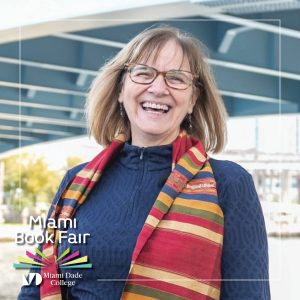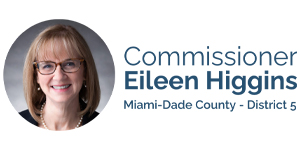
Eileen Higgins, commissioner for Miami’s District 5, grew up in New Mexico in a family of readers and made Miami her home in 2014. She’s a vocal advocate for Miami Book Fair – as well as a Friend – and is looking forward to what’s coming in November.

What compelled you to partner with Miami Book Fair – how does our work support your community-building goals?
One of the things that I find compelling or interesting or inspiring about reading is it’s this amazingly nonthreatening way to encounter difference – different kinds of people, different places, different ideas. Sometimes when you come face-to-face with that it requires this immediate response, and we often don’t know how to immediately respond. And that response – we see it all the time – can be fear or pulling away. But when you read about something you’ve never encountered before, it allows you to thoughtfully consider it, in a very contemplative way. And that enables you to be accepting of all of these kinds of differences when you encounter them in real life. That’s very important in building community.
For me, reading has provided a lot of the food for thought, for example, in responding to the needs of others. For example, Evicted. Boy, was that a compelling tale about what happens to families during the eviction process. In our county we have taken pretty extraordinary steps to do everything we can under the law to protect families from eviction. The cycle of that first eviction can lead to homelessness and trauma for children, and there’s a book that gives you insights into that. We have real problems that need real solutions, affordable housing being one of them. So I’ve been reading all kinds of books about that, like Paved Paradise. And that idea that books can show people what can happen, what can be done, Miami Book Fair does that, on steroids. [laughs] It allows us to encounter thousands of books and ideas in one week. I can’t think of anything else that does that.
You said that you grew up in a family of readers – how does MBF’s work align with your personal thoughts on access to literary culture?
Oh, yeah – it wasn’t uncommon to walk into my house and see everyone sitting in a different chair in the living room reading a book. Miami Book Fair is special; for me, it’s the only place where I get to meet the writers, hear what they think about storytelling and what inspires them – and gosh, they all use different techniques for how they write and when they write.
Another amazing thing about Book Fair is that it’s for everybody; there is something for everyone. You’ve got children’s books, you have independent authors, you’ve got – and this is incredibly important for Miami – you’ve got Spanish-language literature and Haitian Creole literature and authors. I can’t think of another book fair that allows a community to come together across all of its cultures, age groups, and languages to enjoy, be inspired, and every now and then, cry, over what we learn through books. And of course almost all of it is free; the Book Fair team has done a wonderful job to make sure that everyone has that access. We’re so lucky to have something like it.
Do you always attend the Fair?
Every single year that I’ve lived in Miami! I schedule my calendar around the Fair and I already have next year’s dates penciled in.
Have you ever taken advantage of any MBF programming during the year?
Yes! First Draft is so much fun, and I always try to see important authors when they come to town – like Nancy Pelosi, who was just at the Arsht – and I love that the Fair uses locations like the Arsht, Books & Books, and Coral Gables Congregational Church to host them.
What’s a Book Fair moment or experience that still resonates with you?
I’ll never forget listening to Mitch Landrieu talking about his book In the Shadow of Statues. He spoke about his personal examination of how to come to terms with all of these Confederate statues in New Orleans, and how he reached the conclusion that they had to be taken down because they were erected to make people feel lesser. He spoke so compellingly and so beautifully about the fact that allowing these monuments to stand was to willfully ignore that they represent not some period in American history, but a period of history that meant slavery, terror, and violence for Black Americans.
If you could have a one-on-one lunch or dinner with any author, living or dead, who would they be and what would you ask them?
Agatha Christie, but only if I could be floating down the Nile for the interview! [laughs] But the person I’d really like to sit down with is Salman Rushdie, because he is willing to risk his life to tell us stories and I want to know why – and I also want to know what stories he’s worried he won’t get enough time to tell us.
Interview by Elisa Chemayne Agostinho; responses have been edited for space and clarity.